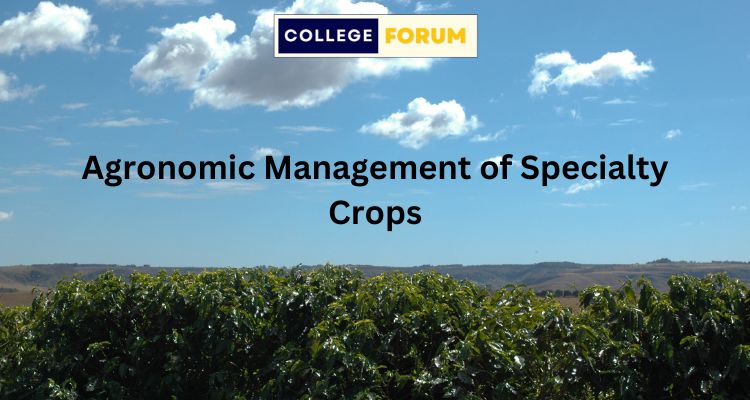Specialty crops, also known as niche or high-value crops, encompass a diverse range of non-traditional crops that are cultivated for their unique characteristics, flavors, and uses. Examples include fruits, vegetables, herbs, spices, medicinal plants, and ornamental crops. Agronomic management of specialty crops plays a crucial role in ensuring their successful cultivation, optimal yield, and quality production. In this article, we explore the key principles and practices of agronomic management specific to specialty crops, emphasizing the importance of MSc Agronomy education in imparting specialized knowledge and skills in this field.
Agronomic management encompasses a wide range of practices aimed at optimizing crop growth, development, and yield while minimizing environmental impacts. When it comes to specialty crops, agronomic management takes on added significance due to the unique requirements and characteristics of these crops. MSc Agronomy education provides students with a deep understanding of agronomic principles and specialized knowledge in managing specialty crops effectively.
One of the fundamental aspects of agronomic management of specialty crops is site selection and soil preparation. Specialty crops often have specific soil and climatic requirements for optimal growth. MSc Agronomy graduates are trained to assess soil characteristics, such as texture, fertility, pH, and drainage, and select suitable sites for specialty crop cultivation. They also learn techniques for soil preparation, including soil amendment, tillage, and mulching, to create a favorable growing environment for specialty crops.
Crop selection and variety selection are critical decisions in specialty crop production. MSc Agronomy programs equip students with knowledge of different specialty crop varieties, their characteristics, and suitability for specific growing conditions. Through coursework and practical experience, students learn how to evaluate and select appropriate crop varieties based on factors such as climate, soil type, market demand, and desired quality attributes.
Once the crop is selected, agronomic management practices focus on crop establishment and maintenance. MSc Agronomy education covers various aspects of crop establishment, including seed selection, planting techniques, spacing, and planting density. Students learn about different propagation methods, such as seed propagation, vegetative propagation, and tissue culture, and how to apply these techniques to specialty crop production.
Agronomic management of specialty crops also involves nutrient management and fertilization. Specialty crops have specific nutrient requirements at different growth stages, and MSc Agronomy graduates are trained to develop nutrient management plans tailored to the needs of specialty crops. They learn about soil testing, nutrient analysis, fertilizer application methods, and timing to ensure optimal nutrient availability for specialty crop growth and development.
Water management is another crucial aspect of agronomic management in specialty crop production. MSc Agronomy programs provide students with knowledge of irrigation techniques, water requirements of specialty crops, and efficient water use practices. Students learn about irrigation scheduling, water conservation strategies, and irrigation system design to meet the water needs of specialty crops while minimizing water wastage and environmental impact.
Pest and disease management are significant challenges in specialty crop production. MSc Agronomy education includes coursework on integrated pest management (IPM) and disease management strategies specific to specialty crops. Students learn about pest and disease identification, monitoring, cultural control measures, biological control, and chemical control options. They also study the importance of crop rotation, companion planting, and habitat manipulation in reducing pest and disease pressure in specialty crop systems.
Weed management is essential for maintaining crop health and productivity in specialty crop production. MSc Agronomy programs cover various weed management strategies, including cultural, mechanical, biological, and chemical control methods. Students learn about weed identification, weed biology, and herbicide selection and application techniques to effectively manage weeds in specialty crop systems while minimizing herbicide resistance and environmental impact.
Harvesting and post-harvest management are critical stages in specialty crop production that influence product quality and marketability. MSc Agronomy graduates are trained in harvest timing, harvesting techniques, handling practices, and post-harvest treatments specific to specialty crops. They learn about post-harvest handling, storage, packaging, and transportation methods to minimize post-harvest losses and maintain product quality from farm to market.
Market access and value addition are integral components of specialty crop production. MSc Agronomy education equips students with knowledge of market trends, consumer preferences, and value-added opportunities for specialty crops. Students learn about market analysis, product differentiation, branding, and marketing strategies to effectively promote and sell specialty crops in local, regional, and international markets.
Sustainability and environmental stewardship are core principles of agronomic management in specialty crop production. MSc Agronomy programs emphasize sustainable farming practices, soil conservation, water conservation, biodiversity conservation, and ecosystem services in specialty crop production systems. Students learn about sustainable intensification, agroecology, and organic farming principles to minimize environmental impact and promote long-term viability of specialty crop production.
In conclusion, agronomic management of specialty crops requires specialized knowledge, skills, and expertise to ensure sustainable production and economic viability. MSc Agronomy education plays a crucial role in preparing students for the challenges and opportunities in specialty crop production. Through comprehensive coursework, hands-on training, and practical experience, MSc Agronomy graduates are equipped to make informed decisions and implement best practices in agronomic management of specialty crops, contributing to the success and resilience of specialty crop production systems.







